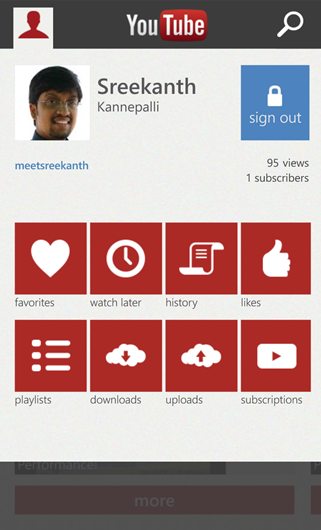Microsoft updates its YouTube Windows Phone app with some concessions to Google

Microsoft is updating its YouTube application for Windows Phone to comply with some, but not all, of Google's terms of service.

On May 7, Microsoft rolled out a YouTube app for Windows Phone 8 that the company developed itself. On May 15, Google sent Microsoft a cease-and-desist letter about that app, noting it violated some of the YouTube terms of service, including not displaying ads and allowing users to download content from the app. Google requested that Microsoft either block or pull the YouTube app from the Windows Phone Store by today, May 22.
Microsoft decided to meet Google part way. The company is rolling out, as of 4 pm ET/1 pm PT on May 22, an updated version of its YouTube app for Windows Phone that disables video downloads, but which still doesn't display ads.
Windows Phone users who've already downloaded the Microsoft YouTube app will lose the video download functionality if and when they apply the update. Those who haven't yet downloaded the app will get the version without the video downloading capability once they grab the app.
A Microsoft spokesperson sent the following statement when I asked about its plans for the app around today's Google-imposed deadline:
“Microsoft updated the Windows Phone YouTube app to address the restricted video and offline video access concerns voiced by Google last week. We have been in contact with Google and continue to believe that our two companies can work together to hone an app that benefits our mutual customers, partners and content providers. We’re earning new customers every day, with IDC reporting recently that Windows Phone posted the largest year-over-year gain among leading operating systems. We look forward to working with Google to maintain a great YouTube experience for the growing number of people who rely on both of our respective products.”
I've reached out to Google for comment on Microsoft's actions. No word back so far.
As a happy Windows Phone user, I can see both Google's and Microsoft's sides in this battle. I want more Windows Phone apps, but I can't blame developers for hesitating to commit time and resources to a platform which is now No. 3 in marketshare, but a very distant No. 3.
Microsoft officials have complained repeatedly and consistently that Google won't provide them with access to necessary application programming interfaces that would allow Microsoft to build a YouTube app for Windows Phone that would serve ads. Microsoft built its YouTube app for Windows Phone with an existing and public YouTube API, but not one that provides ad support.
But Google doesn't allow other phone platform makers, including Apple, BlackBerry and now, Microsoft, to build YouTube apps for their phones. Instead, Google is the one that builds and maintains these native apps.
Google officials have made it clear they aren't interested in supporting Windows 8 or Windows Phone with many Google-developed applications. The implication, at least on the Windows Phone side, is its low market share (around three percent) makes the platform not worth its while to build and support with a native app. Google did build a native YouTube app for Xbox with Microsoft's help, seemingly because of Microsoft's strong share in the gaming console space.
Google has suggested that Windows Phone and BlackBerry users who want to access YouTube do so by going through the mobile YouTube site -- which a Google spokesperson previously said serves up display search and in-stream video ads. (An aside: I don't see these ads on my Windows Phone 8 using IE10, but Google has said they exist.)
Is Google obligated to provide Microsoft with access to its APIs so it can build a YouTube app that complies with its terms of service? I'd argue no, but I'd also point out that Google's CEO recently dinged Microsoft for withholding access to its messaging APIs. Two can play the closed API game. The difference is, Google officials want to claim they are completely open. Microsoft officials don't make that claim.
So now what? Is Google going to sue Microsoft over this? No word. If it does, it could end up giving Microsoft more fodder for its Scroogled Google-bashing campaign -- if not grist for some kind of antitrust complaint, I'd think.
I'm not an app person on my mobile devices. I often find I prefer to access sites like YouTube, Facebook, New York Times and others through my browser rather than through a dedicated app. But what about you, other Windows Phone users?